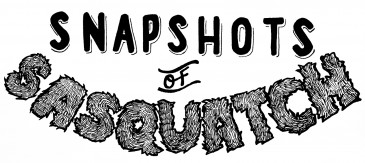
Seattle-based Jherek Bischoff’s orchestral arrangements are the perfect way to begin a music festival — instrumental music that summons anticipation as well as indulgence in the open skies and the buzz of cheap American (pre-drank) beers. He wears a suit and bow tie, and his stage banter is endearingly self-conscious. When the drunk guy in short shorts sitting next to us stops yelling, “You are beautiful!” at every hot girl that walks by, I stretch out on my blanket to savour Bischoff’s voice as it finally joins the swelling melodies.
We are surrounded by barely-21 girls in high-waisted denim shorts, plastic flower-covered headbands and face paint, posing with cigarettes and tall cans of Rolling Rock.
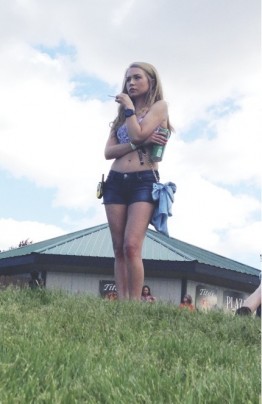
We can see the rain coming down on the other side of the gorge as Timothy Showalter of the folk-infused indie rock act Strand of Oaks bellows against a driving bass that makes my entire body vibrate.
Built to Spill’s we-don’t-give-a-shit-what-we-look-like vibe is refreshing against the crowd’s festival wear. I can’t help but be reminded of a bobble head while watching Doug Martsch sing, but it is pretty incredible to hear his iconic voice live.
The sky is pink when Youth Lagoon begins. From the hill across from the Yeti stage we watch the crowd throw inflatable dalmatians and fire hydrants into the air. Trevor Powers addresses the audience as “Sasquatch.” Just by being here we are Sasquatch, one larger organism, a forest of trees swaying to Powers’ atmospheric music. The energy rises with “Cannons” and those standing start to dance. When “17” begins, the audience becomes so still that its silence feels like an audible part of the performance. Each time the music builds, arms sway: “Don’t stop imagining, the day that you do is the day that you die…”
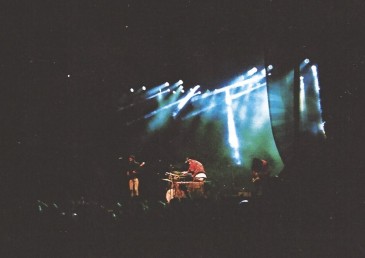
It is not comfortable to watch any show at the Honda stage (I can never remember the actual name for this stage, only the branded one — I am simultaneously impressed and disappointed by this marketing success). I wish Venezuelan-American singer-songwriter Devendra Banhart had been scheduled for the Yeti or Sasquatch stage, where his eclectic brand of folk music could have been epic. Instead, I feel like I am watching a concert at Rogers Arena: A tiny Banhart is visible in the distance through all of the heads in the audience, the sound quality is pretty bad and I can’t stop watching the Jumbotron.
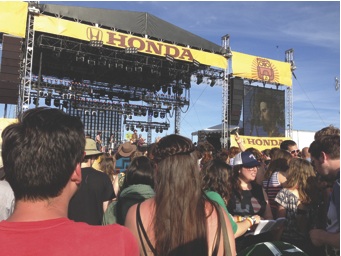
Backstage, Ben Shemie of Montreal’s Suuns addresses the meaning of the song they opened with “Music Won’t Save You,” which covers themes complementary to Dirty Projectors’ “Irresponsible Tune”: Keep playing music. The music doesn’t have to make a difference to the problem. It just has to make a difference to you.
We make out to keep warm during Sigur Ros. It’s so windy up on the hill, looking out into the blackness of the Columbia River Gorge at night. The Icelandic group’s music is haunting, melancholic even, yet intricate and beautiful. The 11 members are little dots amidst a green light show. Out-of-focus camera work plays on the Jumbotron, reminding us that we are here to listen.
At night, the El Chupacabra tent is my claustrophobic nightmare: white plastic walls and ceiling encasing everything, flashing coloured lights, hundreds of sweaty bodies writhing together. A tangle of limbs pulsing with beats, booze, and party drugs. I feel 100 years old.
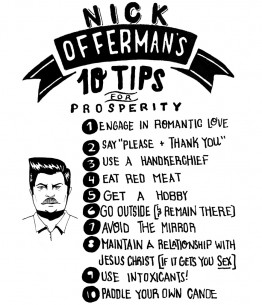
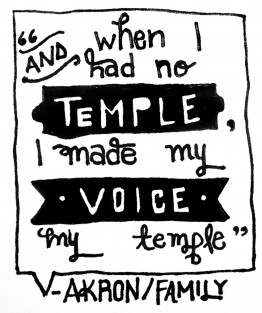
Vancouver-based, two-person guitar and drums act Japandroids play the Honda stage and the guitar part is barely audible. Half of the sound is a lot to lose, no matter how energetic Brian King and David Prowse’s performance is.
We drink cans of Tecate through a beer bong before Edward Sharpe and the Magnetic Zeros, whose last two albums — Up From Below and Here—have endured as personal favourites. It is golden hour at the Sasquatch stage, and we dance and sing amidst the crowd from the first song, “Janglin’,” to the last, “Home.” Encouraged by the light-hearted music, I begin to enjoy being a part of something bigger than myself.
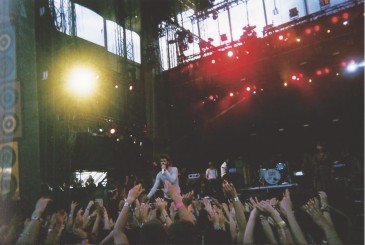
Despite Montreal-based and Vancouver-born Claire Boucher’s well-crafted songs, the sound is so bad at the Honda stage — her voice almost impossible to hear — that the crowd at Grimes’ set starts chanting “Turn it up! Turn it up! Turn it up!” The tighter the crowd packs, the more my buzz turns to nausea. I crouch to vomit, hoping not to hit any feet. Below waist level is so quiet, peaceful even, a thicket of legs and feet as far as I can see in every direction.
Postal Service — whose only album, Give Up, was released in 2003 — is the final act of Sasquatch. Their new songs are disappointing, glossy pop tracks and Ben Gibbard seems to have gotten an image makeover: thinner, cheesier stage banter. Thousands of people dotting the garbage-strewn hill applaud as Gibbard thanks us for staying until the end of the festival. I close my eyes and sing along to all the old songs, at once nostalgic and disconnected from the person I must have been when these lyrics resonated with me.

